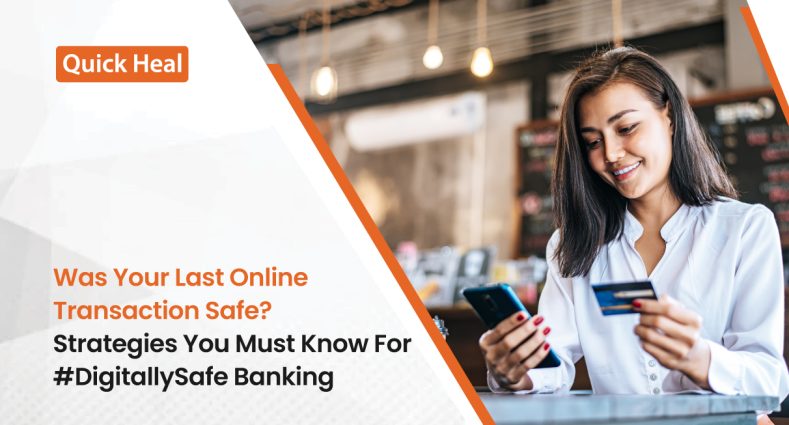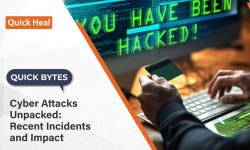Was Your Last Online Transaction Safe? Strategies You Must Know For #DigitallySafe Banking

How many online transactions have you made this week?
Were they digitally safe?
With the rise of fintech apps, UPI, QR codes, etc., making online payments has become easier than ever before. This convenience, accessibility, and ease have increased digital payments worldwide.
Sounds wonderful, right? But, there is a downside to this.
The number of banking frauds has increased significantly with this rising digital payments. Did you know that India is one of the most targeted countries globally by cyber attackers?
According to RBI, banking fraud cost over INR 302.5 billion (equivalent to INR 30,000 cr) in 2023 in India. This includes different types of banking frauds like credit card fraud, authorized push payment fraud, online banking scams, and more.
Why Are Digital Payment Frauds on the Rise in India?
Daily online activities and internet adventures spurred by curiosity have paved the path for cyber attackers to target consumers easily. Here are a few reasons why banking frauds are on the rise in India.
- Low data costs: Due to low data costs, more users are using the internet for work, shopping, making online payments, etc. This has widened the attack surface to feed on more data and conduct banking fraud.
- Convenience: Since making online payments is easier and more convenient than traditional ways, users are relying on it heavily.
- Public Wi-Fi and charging ports: Using charging ports or public Wi-Fi at restaurants, airports, and railway stations can enable fraudsters to hack your device and steal data.
- Public portals: You may frequently access public portals like Aadhaar, travel booking sites, job boards, etc. Cybercriminals find ways to trick you by leading you to websites resembling original portals.
- Adware: If you click on a malicious ad online, it will redirect you to a fraudulent page. This can make your system vulnerable to cyberattacks.
- Malicious apps: Have a habit of searching for new apps? Tread carefully because fraudsters too develop and list malicious apps on app stores. Downloading these apps can give them access to your sensitive data.
The Big Question: How Do We Stay Digitally Safe?
By falling prey to banking fraud, individuals and businesses lose their money, reputation, and sensitive data to attackers. So, to stay safe in this digital world, employ solid security measures like using reliable antivirus software. Here are a few more things you can do:
Keep Devices Secure
Always keep your devices up-to-date. Review your OS and applications periodically to stay clear of vulnerabilities.
Automate the updating process to leave no room for errors or delays. This offers better security and convenience.
Never rely completely on free or in-built security tools.
Install antivirus or anti-malware software such as Quick Heal Total Security on your devices to scan, remove, and proactively protect your data from leaks. In case of a data breach, you will get instant alerts. Quick Heal also allows you to check your privacy score from the dashboard and take required action quickly to stay secure and confident digitally.
In 2023, Quick Heal Total Security was certified by AV Labs, Poland, for safe banking and internet browsing. The company also has multiple patents to protect users from ransomware and malware.
If you wish to know more, explore 7 reasons why Quick Heal Antivirus is the best way to defend yourself against financial fraud.
Secure Password Practices
Simple and easily guessable passwords lead fraudsters to crack and steal your data. Hence, a strong password that comprises numbers, letters, and symbols and is not easily guessable can ensure maximum cybersecurity.
Multi-Factor Authentication (MFA)
This offers high security while logging into any account without leaving a path for fraudsters. MFA will give you the confidence to securely use portals, apps, and websites.
In addition, adopt safe practices like:
- Using the keyboard or safe banking environments for banking online.
- Avoid viewing and clicking on suspicious links.
- Don’t use public charging stations and Wi-Fi when making banking transactions.
- Use only secure apps and portals for banking.
- Suppose you receive a malicious email, Quick Heal antivirus can promptly detect the malware and alert you to prevent you from opening a harmful email or attachment.
- Set Alerts and Monitor Regularly
While you cannot predict the next move of fraudsters, you can safeguard yourself by:
- Using monitoring tools to detect issues on your devices.
- Setting security alerts for your banking or payment accounts.
- Resolving security issues promptly.
In a Nutshell
Online banking offers convenience and ease but comes with certain risks. Hence, it is crucial to employ safe internet practices like using strong passwords, MFA, and trusted antivirus software for safe online banking.
Have you ever faced any banking fraud?
How did you respond to it?
What security technologies do you use to prevent banking attacks?
Try Quick Heal Total Security to automate banking fraud detection and removal, and to get the best internet protection.



No Comments, Be The First!